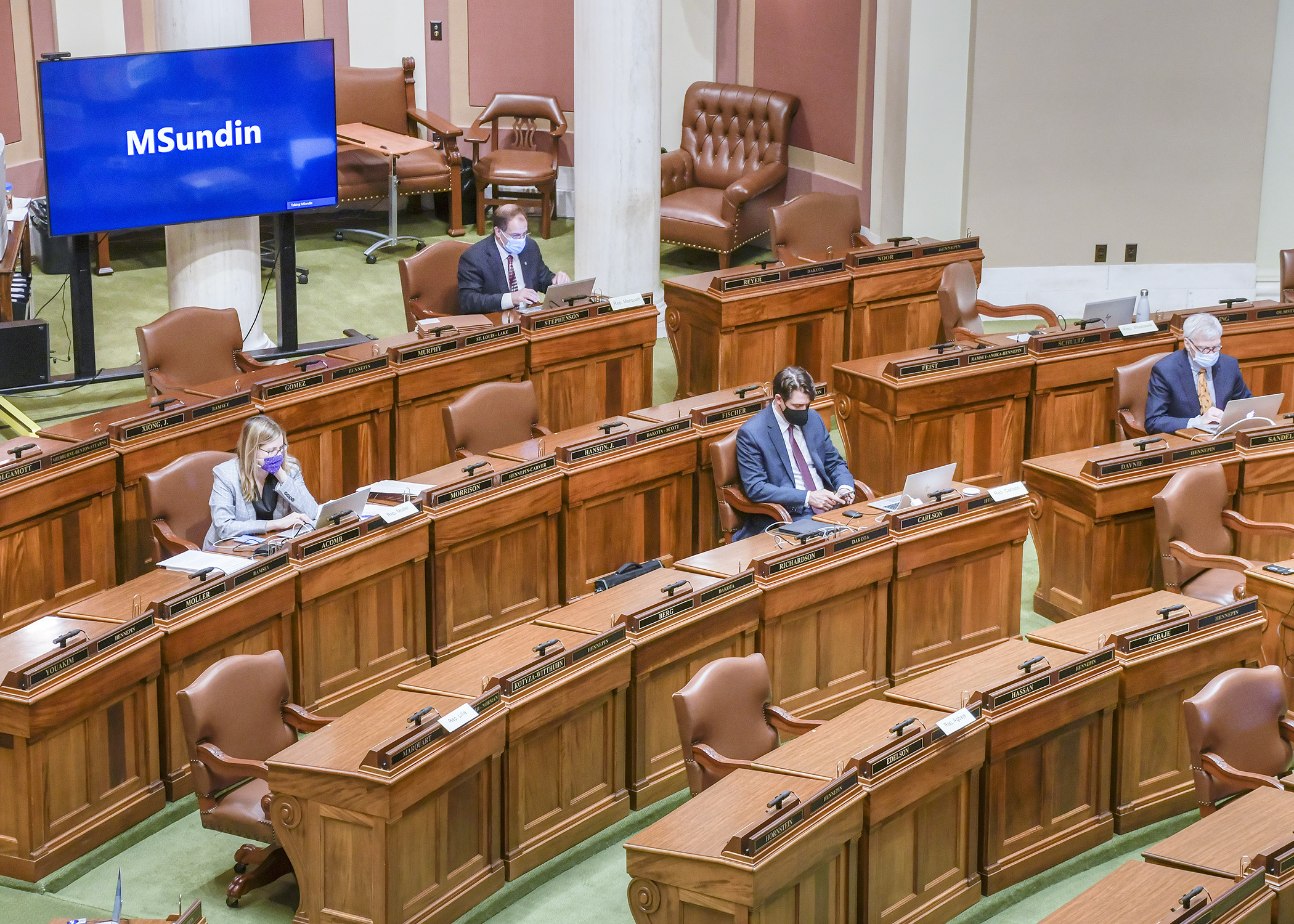House OK's omnibus ag bill that supporters say aids new, existing farmers

The omnibus agriculture and broadband bill, which would boost funding for emerging farmers, increase pesticide fees and restructure the Board of Animal Health and the Farmer-Lender Mediation program, has passed the House.
By a 69-63 vote, HF1524/SF958*, as amended, was passed Thursday and returned to the Senate, where that body's version was passed 48-18 on April 14. A conference committee is expected to work out the differences.
DFLers praise the bill's provisions that would help emerging farmers and cottage food producers, protect soil and pollinators and give farmers more time to reach agreements with creditors.
"This bill addresses both the established farmer and the emerging farmers," said Rep. Mike Sundin (DFL-Esko), who sponsors the bill with Sen. Torrey Westrom (R-Elbow Lake). "Minnesotans deserve this."
Republicans like some provisions in the bill, such as increased funding for biofuels infrastructure and broadband funding, but said they oppose provisions such as a pesticide fee increase and changes to the Board of Animal Health.
The bill would appropriate $163.6 million from the General Fund next biennium, including $112.8 million to the Department of Agriculture and $30.7 million for broadband. Among the most notable spending proposals, it would allocate:
- $31.2 million for the Agricultural Growth, Research and Innovation Program, which represents an 8.6% increase in funding compared to the current biennium;
- $4 million for a biofuels infrastructure financial-assistance program;
- $574,000 for farm-advocate services;
- $500,000 to establish a climate-smart farm endorsement for the Minnesota Agricultural Water Quality Certification Program;
- $300,000 to establish an emerging-farmer office and hire a full-time emerging-farmer outreach coordinator, who must engage and support emerging farmers;
- $200,000 for farm-safety grant and outreach programs; and
- $150,000 for a pilot project creating farmland access teams to provide technical assistance to potential beginning farmers.
The bill would require eligible programs to be paid for with federal COVID-19 aid received under the American Rescue Plan rather than General Fund dollars whenever applicable.
Statutory changes
One of the most debated proposals in the bill would increase the rate of a fee specific to pesticide sales to 0.9%, up from 0.55% for agricultural pesticides and from 0.5% for nonagricultural pesticides.
The increase would mean a farmer would pay a $9 fee on a $1,000 of agricultural pesticides instead of $5.50.
The Department of Agriculture estimates the increased tax would generate approximately $2.25 million annually beginning in fiscal year 2023. It would use the funds in part to hire personnel and buy equipment needed to monitor for three additional chemicals, as recommended by the Office of the Legislative Auditor.
Other notable provisions would:
- require the department to establish and implement a grant program to provide up to $50,000 to eligible farmers for new cooperatives that process or market agricultural services, or the farmers’ agricultural products;
- require people who label and sell agricultural, vegetable, flower or wildflower seed treated with neonicotinoid pesticides to include a caution statement on the product label that includes specified text and a department-approved bee icon. Those seeds would need to be disposed of in a manner consistent with directions and warnings provided;
- allow Minnesotans who sell homemade, shelf-stable foods and beverages such as baked goods to more than quadruple their annual sales without a license;
- exempt small meat processors who butcher fowl and game for hunters from state regulation, provided their annual sales are less than $20,000;
- add two members to the Board of Animal Health: one veterinarian and one person who has knowledge of animal health and is a member of a federally recognized tribe located in Minnesota; and
- increase from 90 to 120 days the period in which creditors are prohibited from enforcing debts subject to the Farmer-Lender Mediation Act.
On Thursday, Republicans unsuccessfully moved amendments that would have stricken down the proposed pesticide fee increase and changes to the Board of Animal Health.
In arguing against them, DFLers noted the auditor's recommendation and said the board needs reforming.
Related Articles
Search Session Daily
Advanced Search OptionsPriority Dailies
Ways and Means Committee OKs proposed $512 million supplemental budget on party-line vote
By Mike Cook Meeting more needs or fiscal irresponsibility is one way to sum up the differences among the two parties on a supplemental spending package a year after a $72 billion state budg...
Meeting more needs or fiscal irresponsibility is one way to sum up the differences among the two parties on a supplemental spending package a year after a $72 billion state budg...
Minnesota’s projected budget surplus balloons to $3.7 billion, but fiscal pressure still looms
By Rob Hubbard Just as Minnesota has experienced a warmer winter than usual, so has the state’s budget outlook warmed over the past few months.
On Thursday, Minnesota Management and Budget...
Just as Minnesota has experienced a warmer winter than usual, so has the state’s budget outlook warmed over the past few months.
On Thursday, Minnesota Management and Budget...